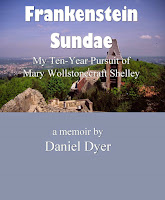A reasonable
question arises from all of this: Did Jack London know who Mary Shelley was? Did
he read any of her works—especially The
Last Man? There are various answers. The definitive three-volume edition of
London’s letters does not include her name in the comprehensive index—though he
does, twice, mention her husband, Bysshe.
The first is
in an 1899 letter to an early friend and supporter, Cloudesley Johns (who later
wrote a memoir mentioning London).[1] In
London’s letter, he says that he’s reading Shelley’s poetry with Mabel
Applegarth (an early love, later fictionalized in Martin Eden); the second is in a 1910 letter to a San Quentin
convict, Henry W. Noyes, who’d sent London some of his verse, asking for
advice. In this latter letter, London indicates some fondness for Shelley’s
work.
He warns
Noyes about the poor market for poetry (some things have not changed!), says
some kind, supportive words about Noyes’ work, then offers this: The intrinsic value of the poems is not to
be considered. If they were as great as Shelley’s, the publishing situation in
the United States to-day would still be the same.[2]
Now, whether
this indicates an intimate knowledge of Bysshe’s poems—or if it’s just a
toss-off—is probably not too hard to infer. We all (most of us?) toss off
comparisons like this one—sometimes alluding to famous works that maybe we
haven’t, uh, actually read? Let’s guess how many allusions to, oh, War and Peace or In Search of Lost Time are based in the writer’s/speakers deep
familiarity with those works?
In another
way … what about London’s considerable personal library? In 1986, scholar David
Mike Hamilton published a book about London’s library, focusing on his annotated
volumes.[3]
London owned more than 15,000 books (many, not all, unfortunately) are now in
the Huntington Library in San Marino, California, a place I spent many hours
while working on my own London projects.
Anyway, there
are no works listed by either Bysshe or Mary Shelley, and neither name appears
in the index. So … this does not, of course, prove that London never read Frankenstein
or The Last Man, but it does make me hesitate,
finally decline, to imply that he did.
Yes, he knew Bysshe’s poems (to some degree)—and he probably knew that his wife
had written Frankenstein.
But it’s
just (apparently) a coincidence that two writers on whom I spent a couple of decades
wrote novels with the same general notion—that a disease can wipe us all out,
and that when that wiping commences, as Yeats wrote in “The Second Coming”: things fall apart; / the centre cannot hold,
mere anarchy is loosed upon the world.
[1] “Who the Hell Is Cloudesley Johns?” mss. at Huntington Library, San
Marino, CA.
[2] The Letters of Jack London, eds. Earle Labor, Robert E. Leitz, III,
I. Milo Shepard, 3 vols. (Stanford, CA: Stanford UP, 1988), 70, 943.
[3] “The Tools of My Trade”: The Annotated Books in Jack London’s Library
(Seattle: U of Washington P).


No comments:
Post a Comment